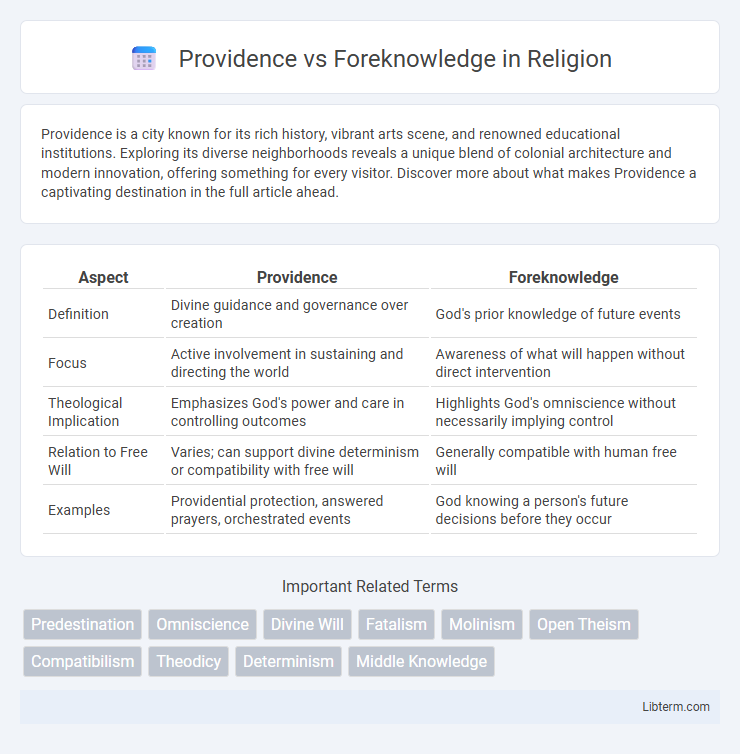Providence is a city known for its rich history, vibrant arts scene, and renowned educational institutions. Exploring its diverse neighborhoods reveals a unique blend of colonial architecture and modern innovation, offering something for every visitor. Discover more about what makes Providence a captivating destination in the full article ahead.
Table of Comparison
| Aspect | Providence | Foreknowledge |
|---|---|---|
| Definition | Divine guidance and governance over creation | God's prior knowledge of future events |
| Focus | Active involvement in sustaining and directing the world | Awareness of what will happen without direct intervention |
| Theological Implication | Emphasizes God's power and care in controlling outcomes | Highlights God's omniscience without necessarily implying control |
| Relation to Free Will | Varies; can support divine determinism or compatibility with free will | Generally compatible with human free will |
| Examples | Providential protection, answered prayers, orchestrated events | God knowing a person's future decisions before they occur |
Defining Providence and Foreknowledge
Providence refers to the divine guidance and governance of the universe, where God actively sustains and directs all events toward a purposeful end. Foreknowledge involves God's complete awareness of future events before they occur, without necessarily causing or determining those events. Both concepts emphasize God's relationship with time and creation, but providence highlights active governance, while foreknowledge emphasizes prior awareness.
Historical Perspectives on Providence and Foreknowledge
Historical perspectives on providence and foreknowledge trace back to early theological debates in Christian, Jewish, and Islamic traditions, where scholars like Augustine and Aquinas sought to reconcile God's omniscience with human free will. Medieval scholasticism emphasized God's eternal knowledge, asserting that divine foreknowledge does not constrain human actions but coexist with providential governance. Later philosophers and theologians expanded on these views, exploring the intricate balance between predestination, divine sovereignty, and the contingency of human choices within the framework of providence and foreknowledge.
Key Philosophical Differences
Providence refers to the divine guidance and governance of the universe, implying that God actively sustains and directs all events according to a purposeful plan. Foreknowledge, on the other hand, denotes God's prior awareness of all occurrences without necessarily implying control or causation over them. The key philosophical difference lies in the causal aspect: providence asserts God's involvement in determining outcomes, whereas foreknowledge emphasizes God's omniscient awareness without mandating divine intervention.
Theological Approaches to Divine Providence
Theological approaches to divine providence explore the relationship between God's sovereign control and human free will, often addressing the tension between providence and foreknowledge. Classical theism posits that God's foreknowledge is timeless, perfectly knowing all events without causing them, preserving human freedom while ensuring divine providence governs the unfolding of history. Process theology challenges traditional views by suggesting God's knowledge is dynamic, emphasizing a cooperative interaction between divine providence and human decisions rather than deterministic foreordination.
Foreknowledge in Classical Theology
Foreknowledge in Classical Theology refers to God's perfect and infallible knowledge of all events before they occur, encompassing every choice and action within creation. This divine attribute asserts that God's awareness is timeless and unchanging, allowing Him to foresee future contingencies without causing or determining them. The doctrine maintains the compatibility of human free will with divine omniscience, emphasizing that foreknowledge does not necessitate predestination or negate moral responsibility.
Debates on Free Will and Determinism
Debates on Providence versus Foreknowledge center around whether divine foreknowledge implies determinism or allows for genuine free will. Theological discourse evaluates if God's foreknowledge necessitates predetermined outcomes, challenging the autonomy of human choice. Philosophers argue that reconciling divine omniscience with libertarian free will remains a core tension in discussions about moral responsibility and predestination.
Scriptural Interpretations and Applications
Scriptural interpretations of Providence emphasize God's continual involvement in creation, as seen in passages like Matthew 10:29-31, where God's care extends even to the smallest details of life. Foreknowledge, highlighted in verses such as Romans 8:29, underscores God's prior knowledge of human choices and events, affirming divine omniscience without necessitating predestination. Applications of these doctrines guide believers in trusting God's sovereign plan while exercising free will, fostering a balanced theological understanding of God's control and human responsibility.
Providence and Foreknowledge in Major Religions
Providence denotes the divine guidance and care over creation, prominently emphasized in Christianity, where God's providence ensures the fulfillment of divine will while allowing human free will. Foreknowledge, significant in Islam, particularly within Sunni theology, refers to God's omniscient awareness of all events before they occur, shaping the framework of predestination without negating human responsibility. Hinduism integrates both concepts through karma and dharma, where divine providence interacts with foreknowledge, reflecting an interplay between cosmic order and individual actions.
Implications for Human Agency
Providence and foreknowledge significantly influence the philosophical debate on human agency by addressing whether divine control or prior knowledge limits free will. The concept of providence asserts that a deity governs all events, suggesting a predetermined order, while foreknowledge implies that future actions are known in advance without necessarily causing them. Understanding these distinctions clarifies the extent to which human decisions are autonomous or influenced by divine omniscience, impacting theological and ethical discussions about accountability and moral responsibility.
Contemporary Discussions and Controversies
Contemporary discussions on Providence versus Foreknowledge engage deeply with the tension between divine sovereignty and human free will, highlighting debates in analytic philosophy and theological circles about God's timeless knowledge and causal influence. Recent controversies involve the compatibility of middle knowledge (Molinism) with classical theism, raising questions about whether divine foreknowledge necessitates determinism or allows genuine human freedom. These discussions often harness modal logic and quantum indeterminacy to explore how Providence can operate without undermining libertarian free will, sustaining a nuanced interplay between divine omniscience and moral responsibility.
Providence Infographic

 libterm.com
libterm.com